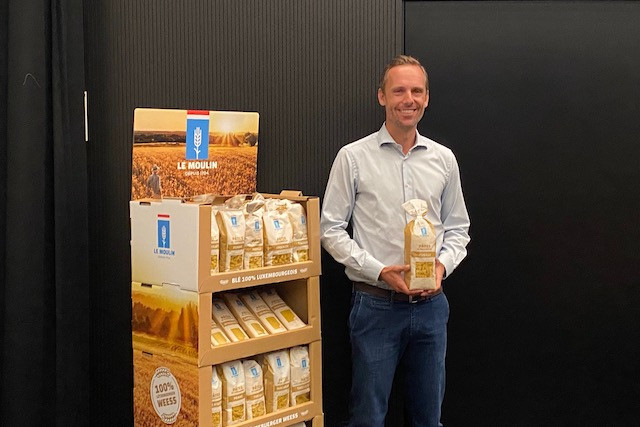“The mission of this brand is to propose products with a Luxembourg grain base,” CEO Jean Muller explained during a Monday press conference in Kahler.
The Le Moulin brand, which carries the Made in Luxembourg label, includes two product lines: the first line of 100% Luxembourg wheat pastas, ranging from spaetzel and macaroni to penne and spaghetti, and a range of flours. The bags of flour are clearly marked not just with the flour types, a number associated with the protein content, which Muller said was an intentional move in order to “make it more understandable” to the consumer. The products are expected to make their way into supermarkets over the next few weeks.
The brand launch marks another milestone for a company that is steeped in tradition over 11 generations, and “each generation has passed on the tradition of knowledge” when it comes to milling.
As Muller explained, until the mid-1990s, most of wheat in Luxembourg was imported from countries like Germany and the United States, but Muller’s father and other millers, along with the chamber of agriculture, collaborated to create the “Produit du terroir” label in 1999, which today groups together over 250 farmers, producing some 18,000 tonnes of wheat annually. The wheat in the programme is guaranteed to be pesticide-free and also takes local biodiversity into account.

The line of Le Moulin flours set to be available in local supermarkets in the coming weeks. Photo: Delano
“Normal year” for the business
Although many businesses have suffered due to the covid-19 crisis and confinement period, for Moulins de Kleinbettingen this has not been the case. As Muller explained, it was “a normal year for us”: while the company saw an increase in individual sales of its products, this was offset by a dip in sales in the gastronomy sector.
Looking ahead, “Our current goal is to implement the new brand and convince consumers about the flour, then will see where volume is,” Muller said, adding that a second phase could see the products used in restaurants. And while it’s not impossible the brand would eventually be sold abroad, “For now it’s a Luxembourg product for the Luxembourg market.”
